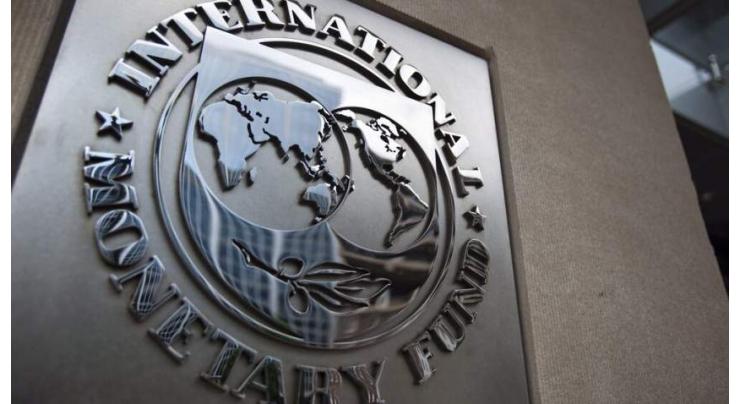
- Home
- Business
- News
- Mideast-related oil price spike threatens 'relatively good' economic outlook: IMF chief economist
Mideast-related Oil Price Spike Threatens 'relatively Good' Economic Outlook: IMF Chief Economist
Sumaira FH Published April 16, 2024 | 07:08 PM

The recent oil price spike fueled by rising Middle East tensions has the potential to derail the IMF's "relatively good" outlook for the world economy, its chief economist told AFP
Washington, (UrduPoint / Pakistan Point News - 16th Apr, 2024) The recent oil price spike fueled by rising Middle East tensions has the potential to derail the IMF's "relatively good" outlook for the world economy, its chief economist told AFP.
"We are projecting a global economy that is quite resilient for 2024," Pierre-Olivier Gourinchas said in an interview ahead of the publication of the International Monetary Fund's World Economic Outlook (WEO) report on Tuesday.
The IMF now expects the world economy to grow by 3.2 percent this year and next, and inflation to continue to ease from its post-pandemic high, hitting 5.9 percent this year, and 4.5 percent next year amid elevated interest rates in many countries.
"The news is relatively good," Gourinchas said.
"One of the things that could derail that path towards disinflation would be some disruption in oil prices or energy prices or commodity prices," he continued.
"So far, we've seen some pressure in oil prices, but it's way too early to figure out whether that will be sustained," he added.
"A lot of the news have been very good on the United States economy over the last six months," Gourinchas said, pointing to robust US productivity growth, an immigration-driven boost in the labor supply, and "quite a bit of public spending."
The rise in foreign-born workers in the US "increases the capacity of the economy to produce more and it also moderates the pressures on the labor market," he said.
"We're still expecting inflation to come down in the course of 2024, and to leave the Federal Reserve in a position where it will be able to start cutting rates later in the year," he said.
In contrast to the resilient US economy, the IMF expects European growth to continue at a more lackluster pace in the short term, predicting 0.8 percent growth for the euro area this year, picking up slightly to 1.5 percent in 2025.
"The consequences of the energy shock are still there to some extent, although this has moderated quite a bit," Gourinchas said.
"But let's not forget that we have tight monetary policy, and that monetary policy is increasing the cost for borrowing and for households and businesses," he added.
Unlike the US, European consumers and businesses are also feeling much less confident in the health of the overall economy, according to Gourinchas.
"That means less consumption, less aggregate demand, less investment," he said. "There is no sign of overheating."
Because of the rapid pace of disinflation in Europe in recent months, the IMF sees the European Central Bank's projection of a June interest rate cut as a "reasonable forecast," Gourinchas said.
Related Topics
Recent Stories

Cricket: England v West Indies 3rd Test scoreboard

Finance minister briefs Chinese officials on reform agenda, engagement with IMF

Finland says Russian vessel violated its territorial waters

Olympic opening ceremony under way on River Seine

West Indies' treble strike rocks England in third Test

Ukraine court orders detention of suspect in murder of nationalist ex-MP

Long queues, ticketing problems ahead of Paris opening ceremony

Rana Sanaullah Khan joins Paris 2024 Olympics inauguration reception

Glowing tributes mark 69th birthday of President Zardari at Governor's House

Players unaware of spying scandal as Canada Olympic coach sent home: official

Naqvi hails Pak women cricketers for going down fighting against SL

'Sabotage' on French rail network before Olympics: What we know
More Stories From Business
-

Finance minister briefs Chinese officials on reform agenda, engagement with IMF
6 hours ago -

Chinese support for CPEC, development projects show deep love with Pakistan: Mushahid
6 hours ago -

G20 seeks common ground on taxing super-rich
6 hours ago -

Stocks rise as inflation data boosts rate cut hopes
7 hours ago -

Land of PSM to be used for establishment of SEZs: NA body told
9 hours ago -

European medicines watchdog rejects new Alzheimer's drug
9 hours ago
-

FBR committed to resolve taxpayer issues in KP, Chairman FBR assures Governor KP
11 hours ago -

Tanveer emphasizes role of SEZs in attracting investment
11 hours ago -

Russian central bank hikes key rate to fight inflation
11 hours ago -

SBP injects Rs9.545 trillion into market
11 hours ago -

PSX stays bearish, loses 439 points
11 hours ago -

US Fed's favored inflation measure cools further in June
12 hours ago

















